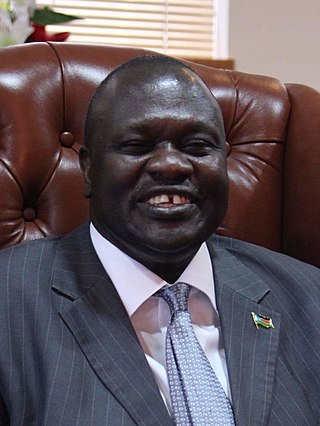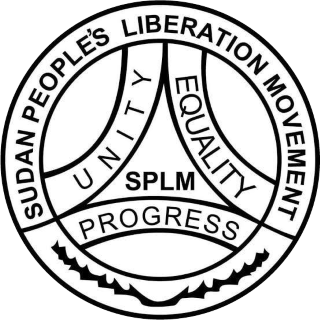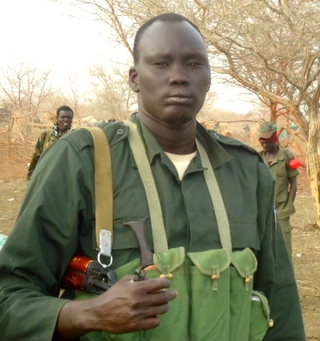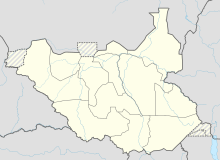
Salva Kiir Mayardit, commonly known as Salva Kiir, is a South Sudanese politician who has been the President of South Sudan since its independence on 9 July 2011. Prior to independence, he was the President of the Government of Southern Sudan, as well as First Vice President of Sudan, from 2005 to 2011. He was named Commander-in-Chief of the Sudan People's Liberation Army (SPLA) in 2005, following the death of John Garang.

Riek Machar Teny Dhurgon is a South Sudanese politician who has served as the First Vice President of South Sudan since 2020.

The Sudan People's Liberation Movement is a political party in South Sudan. It was initially founded as the political wing of the Sudan People's Liberation Army in 1983. On January 9, 2005 the SPLA, the SPLM and the Government of Sudan signed the Comprehensive Peace Agreement, ending the civil war. SPLM then obtained representation in the Government of Sudan, and was the main constituent of the Government of the then semi-autonomous Southern Sudan. When South Sudan became a sovereign state on 9 July 2011, SPLM became the ruling party of the new republic. SPLM branches in Sudan separated themselves from SPLM, forming the Sudan People's Liberation Movement–North. Further factionalism appeared as a result of the 2013–2014 South Sudanese Civil War, with President Salva Kiir leading the SPLM-Juba and former Vice President Riek Machar leading the Sudan People's Liberation Movement-in-Opposition.
Kuol Manyang is a South Sudanese politician. He is a member of the SPLM. He became governor of Jonglei state on 15 December 2007, following the first former governor, Philip Thon Leek from Dinka Bor, to curb cattle raiding and abduction of children in the region.

The South Sudan People's Defence Forces (SSPDF), formerly the Sudan People's Liberation Army (SPLA), is the military force of the Republic of South Sudan. The SPLA was founded as a guerrilla movement against the government of Sudan in 1983 and was a key participant of the Second Sudanese Civil War, led by John Garang. After Garang's death in 2005, Salva Kiir was named the SPLA's new Commander-in-Chief. As of 2010, the SPLA was divided into divisions of 10,000–14,000 soldiers.

Gabriel Gatwech Chan, better known by his nom de guerre Tanginye, was a South Sudanese military officer and rebel commander of various ethnic Nuer militant groups during the Second Sudanese Civil War and South Sudanese Civil War.
Peter Gatdet Yak, better known as Peter Gadet, was a South Sudanese general and SPLA commander who became the leader of the South Sudan Liberation Army (SSLA), a rebel movement in South Sudan.
Clement Wani Konga is a Mundari leader who fought in the Anyanya independence movement in the south of Sudan in 1969−72. He then joined the army of Sudan and rose to the rank of major general. In 2004 he made peace with the Sudan People's Liberation Movement (SPLM) and was appointed interim governor of Central Equatoria in South Sudan. In August 2015 he was dismissed from his post by president Salva Kiir Mayardit. He continued to be active as chairperson of the Mundari Community.
Ethnic violence in South Sudan has a long history among South Sudan's varied ethnic groups. South Sudan has 64 tribes with the largest being the Dinka, who constitute about 35% of the population and predominate in government. The second largest are the Nuers. Conflict is often aggravated among nomadic groups over the issue of cattle and grazing land and is part of the wider Sudanese nomadic conflicts.
The South Sudan Democratic Movement (SSDM), sometimes called the South Sudan Democratic Movement/Army (SSDM/A), was a South Sudanese militant group. Along with its armed wing, the South Sudan Defence Army (SSDA), rebelled against the government of South Sudan led by President Salva Kiir Mayardit and the Sudan People's Liberation Movement.

David Yau Yau is a South Sudanese politician and former militant. He served as Governor of Boma State from 2018 to 2020 and as the Chief Administrator of the Greater Pibor Administrative Area of South Sudan. He was previously the leader of a Murle insurrection against the South Sudanese government.

The South Sudanese Civil War was a multi-sided civil war in South Sudan between forces of the government and opposition forces. In December 2013, President Salva Kiir accused his former deputy Riek Machar and 10 others of attempting a coup d'état. Machar denied trying to start a coup and fled to lead the Sudan People's Liberation Movement-in-Opposition (SPLM-IO). Fighting broke out between the Sudan People's Liberation Movement (SPLM) and SPLM-IO, igniting the civil war. Ugandan troops were deployed to fight alongside the South Sudanese government. The United Nations has peacekeepers in the country as part of the United Nations Mission in South Sudan (UNMISS).

The Sudan People's Liberation Movement-in-Opposition, also known as the anti-governmental forces (AGF), is a mainly South Sudanese political party and rebel group that split from the Sudan People's Liberation Movement in 2013, due to political tensions between President Salva Kiir and Vice President Riek Machar over leadership of the SPLM. Tensions grew between forces loyal to Kiir and Machar and South Sudan plunged into the South Sudanese Civil War.
Mathiang Anyoor, also spelled Mathiang Anyur, also known as Dot Ke Beny, is a Dinka-affiliated militia group in South Sudan. Originally an ad-hoc volunteer force founded in 2012, the militia was transformed into a private army to protect President Salva Kiir Mayardit and army chief Paul Malong Awan. However, the South Sudanese military (SPLA) claims that it is just another battalion. Much of the ethnic violence against non-Dinkas in the South Sudanese Civil War is attributed to the militia.
The South Sudan United Front/Army (SS-UF/A), often just called South Sudan United Front (SS-UF), is a South Sudanese rebel group which has taken part in the South Sudanese Civil War.
The 2014 retreat from Western Bahr el Ghazal, also called the long march north, was an unorganized withdrawal by hundreds of Nuer Sudan People's Liberation Army (SPLA) deserters who sought to flee from Bahr el Ghazal to Sudan during the South Sudanese Civil War. After longstanding tensions between SPLA soldiers belonging to the Dinka and Nuer ethnic groups escalated on 25 April 2014, leading to a massacre of Nuer soldiers at Mapel in Western Bahr el Ghazal, a large number of Nuer SPLA soldiers deserted to escape ethnic prosecution and loyalist SPLA forces. Though some deserters joined SPLM-IO rebels or surrendered to the government, a large number of them marched northward, joined by other SPLA defectors from Northern Bahr el Ghazal. After covering over 400 kilometres (250 mi), this trek eventually arrived in Sudan on 4 August 2014, where they were disarmed.
This article lists events from the year 2019 in South Sudan
Kuol D. Kuol is a former South Sudan People's Defence Forces (SPLA) general and the chief administrator of the Abyei Area since June 29, 2020.
On 4 January 2018, SPLM-IO rebels loyal to Chan Garang Lual attacked the western parts of Juba, the capital of South Sudan. The raid was part of the South Sudanese Civil War. Once in Juba, the insurgents were reportedly joined by Sudan People's Liberation Army (SPLA) soldiers who were loyal to deposed chief of staff Paul Malong Awan. Following heavy fighting lasting until early 5 January, the rebels retreated into the countryside. Even though Chan Garang assumed responsibility for the attack, both the South Sudanese government and the SPLM-IO condemned the clashes, with the latter claiming that its forces had not been involved at all.
The Nuer massacre, which occurred from December 15 to December 18, 2013, was a well-organized, intentional mass killing perpetrated against thousands of Nuer civilians by Dinka SPLA soldiers, Presidential Guard - Tiger Division, and Mathiang Anyoor, supported by Uganda People's Defence Forces (UPDF), orchestrated by the President of the Republic of South Sudan Salva Kiir Mayardit, Jieng Council of Elders (JCE), and Dinka high-ranking military generals within the SPLA army in Juba. More than 47,000 Nuer civilians were massacred in four days between December 15 and December 18, 2013. A couple of years later, the death toll was projected to be over 50,000 Nuer civilians as fighting rapidly engulfed the entire region of the Upper Nile.









